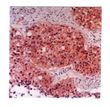AKR1C2 Mouse Monoclonal Antibody [Clone ID: T101]
Other products for "AKR1C2"
Specifications
| Product Data | |
| Clone Name | T101 |
| Applications | ELISA, IF, IHC, WB |
| Recommended Dilution | Immunohistochemistry. Immunofluorescense. Enzyme Immunoassay. Western blot (1/250-1/500): Detects a 32 kDa band in human breast cancer tissue and Porcine liver tissue. Positive Control: Human breast cancer and Porcine liver tissue. |
| Reactivities | Human, Mammalian, Mouse, Porcine |
| Host | Mouse |
| Isotype | IgG1 |
| Clonality | Monoclonal |
| Immunogen | Hybridoma produced by the fusion of splenocytes from mice immunized with recombinant type 2 Dihydrodiol Dehydrogenase from Human lung cancer and Mouse myeloma cells. |
| Formulation | PBS containing 0.02% Sodium Azide as preservative. State: Liquid |
| Storage | Store the antibody (in aliquots) at -20°C. Avoid repeated freezing and thawing. |
| Stability | Shelf life: One year from despatch. |
| Gene Name | Homo sapiens aldo-keto reductase family 1, member C2 (AKR1C2), transcript variant 1 |
| Database Link | |
| Background | DDH is a member of aldo-keto reductase superfamily (1,2), which catalyzes reduction of aldehyde or ketone to a corresponding alcohol by using NADH or NADPH as a cofactor. In liver, the enzyme is abundantly located in the cytoplasm as a monomeric 34-36 kDa protein (3,4). Interestingly, by differential display Shen et al. (5) has shown that overexpression of DDH could be identified in ethacrynic acid-induced drug-resistant human colon cancer cells. Detection of DDH overexpression in drug-resistant human stomach cancer cells, which were selected by the gradual adaptation to daunorubicin, further suggested that DDH might be associated with the drug-resistance in cancer cells (6). In a recent study, DDH expression was further shown to have prognostic significance in patients with NSCLC. By using an immunohistochemical method to determine DDH expression in surgical specimens, DDH expression was identified in patients with leukemia, lung cancer, esophageal cancer, transitional cancer and breast cancer. Furthermore, overexpression of DDH was confirmed by immunoblotting and in situ hybridization. Correlation between clinicopathological parameters and DDH expression as well as the prognostic significance of DDH expression in patients with advanced cancer was indicated. |
| Synonyms | 3-alpha-HSD3, Dihydrodiol dehydrogenase 2 |
| Reference Data | |
| Protein Families | Druggable Genome |
| Protein Pathways | Metabolism of xenobiotics by cytochrome P450 |
Documents
| Product Manuals |
| FAQs |
{0} Product Review(s)
0 Product Review(s)
Submit review
Be the first one to submit a review
Product Citations
*Delivery time may vary from web posted schedule. Occasional delays may occur due to unforeseen
complexities in the preparation of your product. International customers may expect an additional 1-2 weeks
in shipping.






























































































































































































































































 Germany
Germany
 Japan
Japan
 United Kingdom
United Kingdom
 China
China




